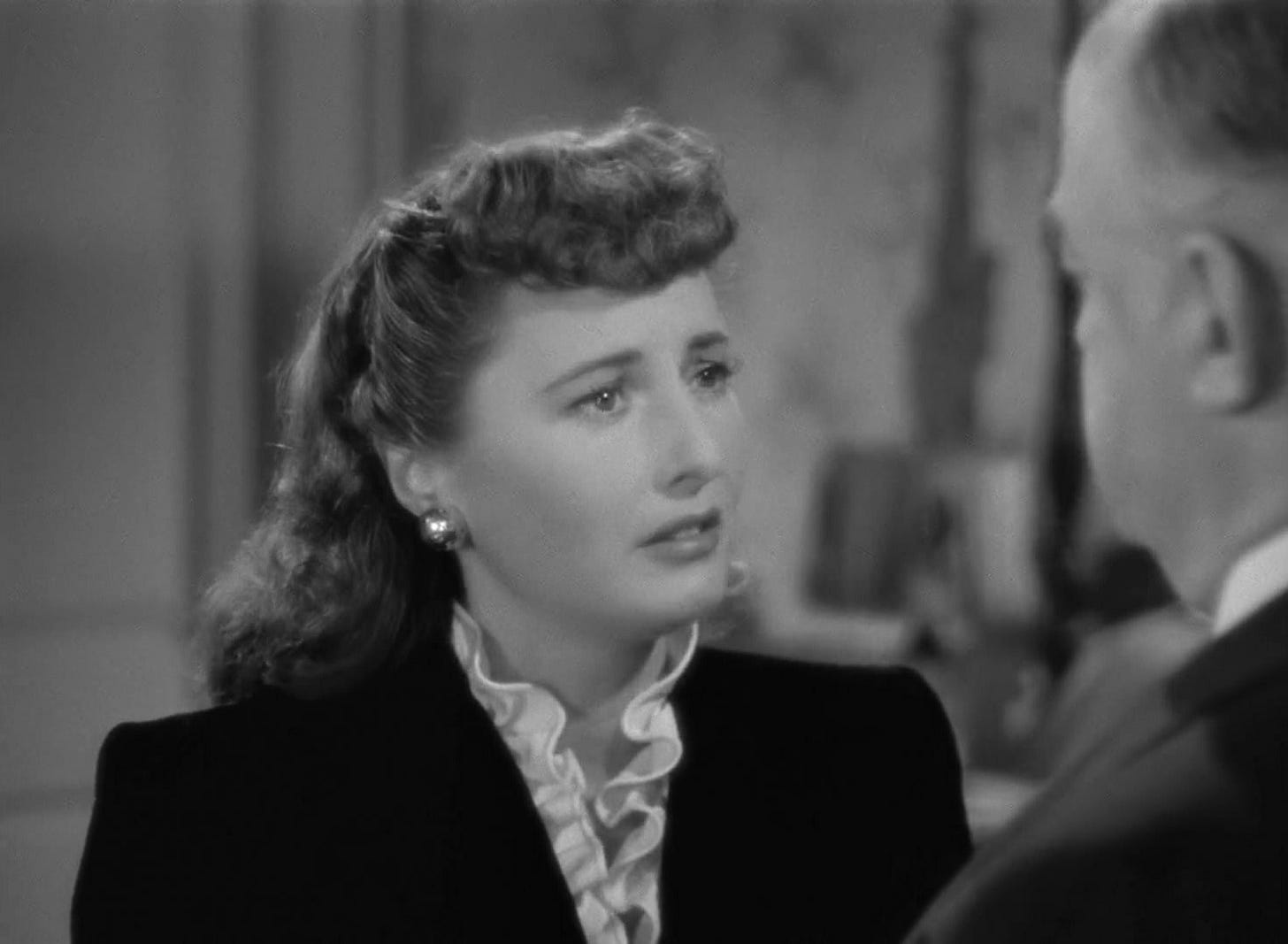Christmas In Connecticut
I admire her very much. I think she’s about the swellest person I ever met.
Life at Christmas time looks different for everyone, but to popular column writer Elizabeth Lane, life at Christmas looks like something out of a Thomas Kinkade painting. Home is a farmhouse in Connecticut covered in a blanket of snow, with a horse and carriage delivering guests to the front door. Company is her husband, her baby, and the donkey she keeps in her barn.
Her hobbies include taking care of her family by cooking for them and being the devoted mother all her readers dream of being themselves. Elizabeth Lane is the picture-perfect housewife of 1945. Unfortunately, it's all a facade. However, in order to keep her job, Elizabeth must fake marry her friend, John Sloan, move into his Connecticut farmhouse, and borrow his neighbor's baby long enough to convince her boss this really is her life.
Christmas In Connecticut, released in August 1945, a little less than a month before World War II ended, follows a character living a lie, writing about her life as a housewife on a farm when, in reality, she lives alone in a New York City apartment. For this week's newsletter, I decided to stray from the classic Christmas movies shown on TV on a loop every Christmas season and write about something a little lesser known that I hadn't seen before.
Christmas In Connecticut is a lot less whimsical than the other movies I've covered this season. It makes no mention of Santa and pushes no messages of believing and the true meaning of Christmas. However, what I found is that Christmas In Connecticut was pretty ahead of its time in terms of Elizabeth's character.
While she hid behind her fabricated life, she was actually a single woman living off of her own money in Manhattan. While that's pretty common today, it wasn't the typical lifestyle of that time period, hence why Elizabeth had so many female readers who resonated with her story of being a housewife. While Elizabeth wasn't exactly Rosie The Riveter, I do believe her character painted women in a positive light and deviated from the way older movies typically portrayed female characters.
Elizabeth Defies The Norms of 1945
Today, women are encouraged to start their own businesses, and if a woman started a column about her single life in New York City, it would gain much more traction than one about a housewife. Elizabeth had to fit the mold of what was expected of women in 1945, so in order to make money for herself and enough to buy herself a mink coat, which she showed off to Felix at the beginning of the film, she had to lie.
This may go against most people's morals, but there's also something comical and empowering about Elizabeth crafting a false identity in order to make ends meet and not have to live a life that she doesn't enjoy. She clearly doesn't mind being single, considering how difficult it was for her to surrender and fake marry her friend John, and despite her lies, she still has a lot of integrity.
While hustle culture and the girl-boss mindset are facing a lot of critique nowadays, there was a time when the world needed more of this, and to see this message being promoted in a 1945 film is incredibly progressive for the time period. Though, it makes sense that this film would take place in the World War II time period as that was the first time women were stepping into the roles of men as most of them were away at war.
Even though Elizabeth's lifestyle is pretty groundbreaking for 1945, Christmas In Connecticut doesn't fail to remind viewers that nothing about her life was acceptable at the time. If it was, she wouldn't have had to lie for her column; she would have been able to write about her real life instead. This is even clearer when her publisher finds out the truth, and he's furious because he's terrified of how it would reflect on him.
He doesn't even consider that if Elizabeth started writing about her real life, it might resonate with readers too because her real life was so uncommon. At one point, he even pressures John into having a second baby with Elizabeth in order to bring in more readers and compete with an up-and-coming columnist with a similar story to the one Elizabeth made up.
“I'm tired of being pushed around. Tired of being told what to do. Tired of writing your god-darned articles. Tired of dancing to everybody else's tune. Tired of being told whom to marry. In short... I'm tired!”-Elizabeth Lane, Christmas In Connecticut.
Despite all the backlash, Elizabeth remains true to herself, outside of her fake lifestyle, throughout Christmas In Connecticut. She has a strong sense of self, and she doesn't lose who she is even as she pretends to be someone completely different. At one point, her love interest in the film, Jefferson, even points out that she's a lot different than he expected her to be.
The two defy gender norms in one scene where Elizabeth is trying to bathe her daughter but clearly has no idea how to take care of a baby. The funny part is that even today, people assume women are naturally nurturing towards children, but if anything, Elizabeth seems uncomfortable and clueless.
It's Jefferson who takes over as he tells Elizabeth that he's helped out a lot with his sister's children, so he knows exactly what to do. Elizabeth challenges stereotypes again when it's revealed she has no idea how to cook. She attempts to make pancakes with her friend and chef Felix, but all she does is continuously throw them up, getting them stuck on the ceiling.
What Elizabeth is good at is writing and living the independent life that she built for herself. It's even more liberating at the end of the film when she finally stands up to her publisher, Mr. Yardley, and tells him she's tired of living her life trying to meet other people's expectations.
“All my life, I promised myself a mink coat. You know, Felix, it's very important to keep promises, especially to yourself.”-Elizabeth Lane, Christmas In Connecticut.
However, Elizabeth doesn't exactly go back to her life as it is, as she ends up falling in love with Jefferson, and the film ends with the two deciding to be together. While it's unclear where they'll live or how their life will pan out, it's suggested it will not be the same as the fake life Elizabeth created with John in order to please Mr. Yardley.
Elizabeth & Jefferson's Christmas Love Story
Jefferson is the one who sets the story of Christmas In Connecticut into motion as he learns about Elizabeth's column in the hospital after returning from war and his nurse, Mary Lee, whom he pretends to be in love with in order to get better food, sends him to her house so he'll see what it's like to be taken care of by a housewife. The plan backfires when Jefferson and Elizabeth seem attracted to each other from the moment he arrives at the front door of the farmhouse.
While it may seem like the foundation of their relationship is built on a lie (especially as Jefferson makes no mention of the nurse who thinks they're engaged), Elizabeth's ability to remain true to herself wins Jefferson over so much so that he's unphased by her other lies. As for Jefferson keeping his engagement a secret despite admitting to having feelings for Elizabeth, she’s initially pretty angry, though she gets over it quickly when Jefferson tells her Mary married his shipmate.
The two have many moments that suggest they'll end up together, but during the scene where they're washing the baby together, it feels like a snapshot of what their life could potentially look like in the future. Another comes when Elizabeth and Jefferson return her cow to its barn, and they finally admit that despite her being married and him being secretly engaged, they both like each other.
When a pile of snow falls on top of them and knocks them to the ground, Elizabeth instinctively cuddles up to Jefferson and thinks it's him who asks her if she's okay when it is actually John. At the end of Christmas In Connecticut, when Elizabeth's secret gets out, and Jefferson finds out his nurse fiancé actually married someone else, the two are free to be together.
I don't think Elizabeth ending up with Jefferson takes anything away from how groundbreaking her character was for the time. In fact, it's actually more empowering that Elizabeth fell in love with a man who accepted her for who she was and was unphased by the fact that she wasn't the housewife she pretended to be. Nurse Mary's plan backfired in many ways, but by sending Jefferson to be taken care of as a housewife so he would want to marry her, she actually set him up to fall in love with someone entirely different.
In my perfect ending, Elizabeth would return home to New York City with Jefferson, and she would start a column about her real life as the two built their lives together. Maybe she would eventually end up in a farmhouse with a family, but she would do it with integrity on her own terms, not because she was forced into it out of fear of losing her job. Despite the year, I think Elizabeth eventually would find her audience, and she might go down in history as a trailblazer for all the single New York women who came after her.






